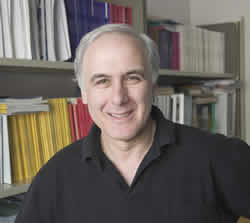3 Questions with Steve Peverly
How does your current research and that of fellow TC faculty members make an impact on the global community?
The quality of our research is the primary foundation for TC's reputation both nationally and internationally, and that, in turn, is the primary driver of admissions applications received by the College. Our graduates go on to disseminate the knowledge and apply the skills they learned at TC. Ultimately, they generate research in their locales, improve the delivery of education and schooling, and write legislation that promotes greater access and equity in education. Read more...
Stephen T. Peverly is Professor of Psychology and Education and Chair of the department of Health and Behavior Studies at Teachers College. His research focuses on two areas: the cognitive processes that underlie reading comprehension and studying, and the cross-cultural differences between U.S. and Chinese children in mathematical performance and the reasons for differences in performance. He teaches courses on memory, reading comprehension and studying, and law and ethics for school psychologists.
How does your current research
and that of fellow TC faculty members make an impact on the global community?
The quality of our research is the primary foundation for TC’s reputation both
nationally and internationally, and that, in turn, is the primary driver of
admissions applications received by the College. Our graduates go on to
disseminate the knowledge and apply the skills they learned at TC. Ultimately,
they generate research in their locales, improve the delivery of education and
schooling, and write legislation that promotes greater access and equity in
education.
What are the most important educational skills we can teach children to
prepare them to be competitive on the world stage?
I will focus on basic skills, which are the foundation for all future learning. All children need to be competent in the skills that will enable them to access advanced curricula.
Competence in reading, for example, is a basic cognitive skill that enables student to access curriculum in all domains. Writing is another cognitive tool with wide application. Competence in basic mathematics provides access not only to future mathematics courses but to mathematics-related domains (for example, pure and applied sciences) and professions such as engineering and medicine.
Many of our programs train teachers to provide highly competent instruction in basic academic skills. Other programs, like our psychology program, focus on creating home and school environments that promote the social and emotional skills children need to profit from instruction, develop friendships, navigate difficult personal and professional relationships, and solve interpersonal problems.
Why should alumni and friends
support TC and 125 Hours of Giving
A weak economy and the rising costs of education have created hardships for many students and their families. To keep our competitive edge and commitments to educational equity – and to continue to be able to provide a high-quality education to those who might not otherwise be able to afford to come to TC -- we need the support of our friends and alums. In other words, we want to continue to give to future generations of students what we have been able to give to past generations.
Published Wednesday, Jul. 24, 2013
